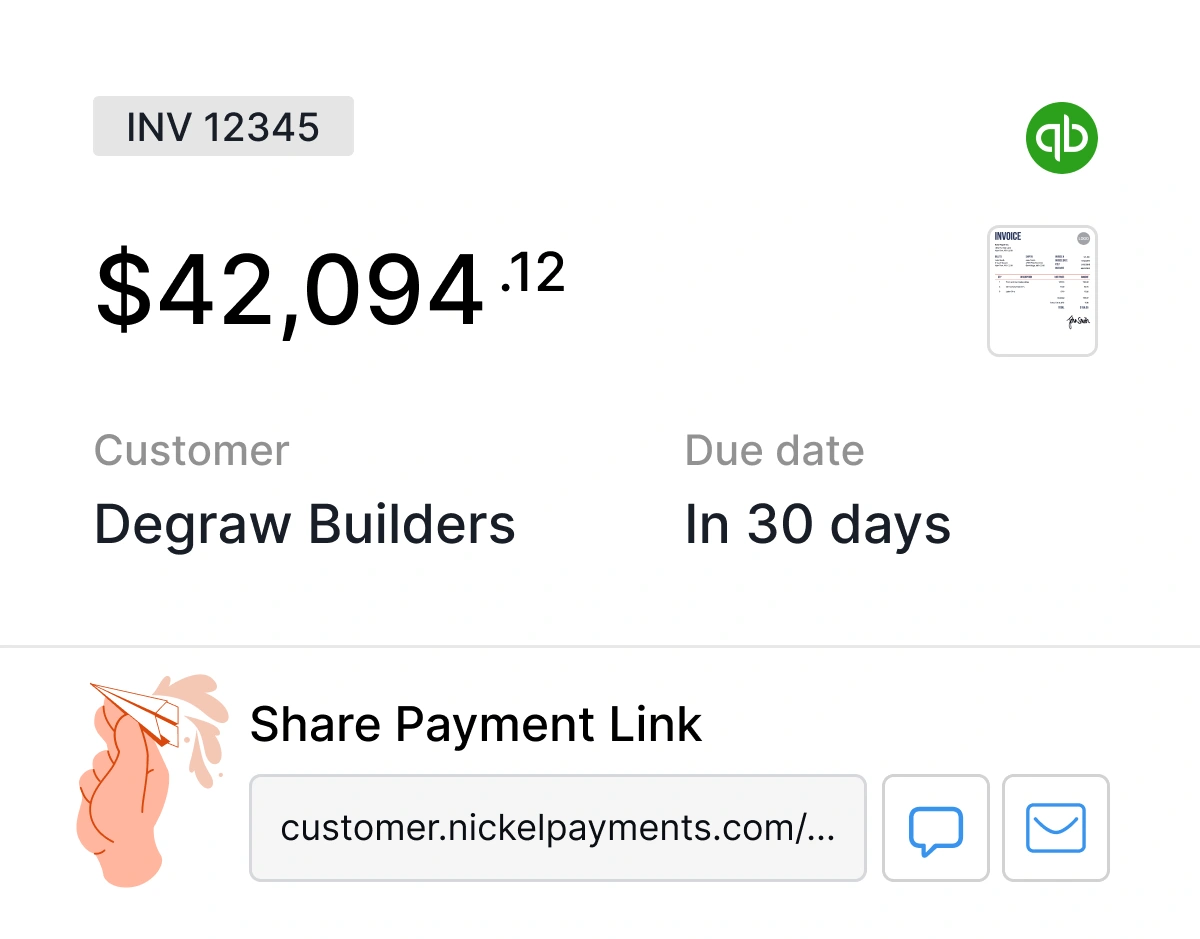The Payment Platform Built for Site Preparation Contractors
Break ground on better cash flow with payments that actually work for excavation and site prep professionals

Trusted by 10,000+ industrial small businesses














































Why Site Preparation Contractors Are Switching to Nickel
Unlike traditional payment processors that treat you like a "high-risk" business, Nickel was built specifically for contractors who handle large invoice-based transactions. We understand that:
- $75,000 site clearing and grading payments are normal business operations, not suspicious activity
- Seasonal weather patterns create payment surges that banks often flag as unusual
- You need reliable processing during peak construction months when developers push projects forward
- Your cash flow depends on predictable payment timing, not arbitrary account reviews
Result: No surprise account holds, no "business verification" delays, no risk department calls.

Why Site Preparation Contractors Are Switching to Nickel
Unlike traditional payment processors that treat you like a "high-risk" business, Nickel was built specifically for contractors who handle large invoice-based transactions. We understand that:
- $75,000 site clearing and grading payments are normal business operations, not suspicious activity
- Seasonal weather patterns create payment surges that banks often flag as unusual
- You need reliable processing during peak construction months when developers push projects forward
- Your cash flow depends on predictable payment timing, not arbitrary account reviews
Result: No surprise account holds, no "business verification" delays, no risk department calls.
Before Nickel vs. After Nickel
The Hidden Crisis Facing Site Prep Contractors
The $100+ billion site preparation industry faces unique payment challenges that generic processors simply don't understand. With over 35,000 site prep establishments competing for work and developers increasingly demanding extended payment terms, contractors are caught between rising equipment costs and shrinking profit margins.
Project Size Volatility:
Site preparation projects vary dramatically in scope and payment amounts. A residential subdivision might involve $50,000 in grading work, while a commercial development could require $500,000+ in excavation, utilities installation, and soil stabilization. Traditional banks view these payment fluctuations as red flags, leading to account holds right when contractors need cash flow most for equipment payments and crew wages.
Equipment and Fuel Cost Pressure:
Site prep work requires significant upfront investment in heavy equipment. A single excavator can cost $300,000-500,000, while bulldozers range from $200,000-400,000. With fuel costs representing 15-20% of operating expenses and equipment financing payments due monthly, contractors often finance their own customers for 30-90 days while carrying these substantial overhead costs.
Weather-Dependent Revenue Cycles:
Site preparation work is heavily weather-dependent, with many regions seeing 70% of annual revenue concentrated in six months. Spring thaw brings the busiest season for foundation excavation and utility installation, while winter weather can shut down operations entirely. Banks don't understand these seasonal patterns, flagging peak-season payment surges as unusual activity.
Subcontractor Payment Complexity:
Large site prep projects involve multiple specialized subcontractors - utility installation crews, soil testing companies, surveying teams, and trucking operations for material hauling. Managing these payments while waiting for your own collections from developers creates a cash flow timing challenge that traditional banking wasn't designed to handle.

The Hidden Crisis Facing Site Prep Contractors
The $100+ billion site preparation industry faces unique payment challenges that generic processors simply don't understand. With over 35,000 site prep establishments competing for work and developers increasingly demanding extended payment terms, contractors are caught between rising equipment costs and shrinking profit margins.
Project Size Volatility:
Site preparation projects vary dramatically in scope and payment amounts. A residential subdivision might involve $50,000 in grading work, while a commercial development could require $500,000+ in excavation, utilities installation, and soil stabilization. Traditional banks view these payment fluctuations as red flags, leading to account holds right when contractors need cash flow most for equipment payments and crew wages.
Equipment and Fuel Cost Pressure:
Site prep work requires significant upfront investment in heavy equipment. A single excavator can cost $300,000-500,000, while bulldozers range from $200,000-400,000. With fuel costs representing 15-20% of operating expenses and equipment financing payments due monthly, contractors often finance their own customers for 30-90 days while carrying these substantial overhead costs.
Weather-Dependent Revenue Cycles:
Site preparation work is heavily weather-dependent, with many regions seeing 70% of annual revenue concentrated in six months. Spring thaw brings the busiest season for foundation excavation and utility installation, while winter weather can shut down operations entirely. Banks don't understand these seasonal patterns, flagging peak-season payment surges as unusual activity.
Subcontractor Payment Complexity:
Large site prep projects involve multiple specialized subcontractors - utility installation crews, soil testing companies, surveying teams, and trucking operations for material hauling. Managing these payments while waiting for your own collections from developers creates a cash flow timing challenge that traditional banking wasn't designed to handle.
Simplified Modern Workflow
Send invoice (or use your existing invoicing)
Customer pays instantly via secure link
Payment auto-syncs to QuickBooks
Money hits your account in 2 business days
Built-in QuickBooks Integration
Your payments automatically sync to the right invoice, customer, and job. No more:


Compare: Nickel vs. Other Payment Platforms
What This Means for Your Site Preparation Business
Save Money
Zero ACH fees: Save $15,000-25,000 per year on a typical site prep operation No hidden costs: No setup fees, monthly fees, or surprise charges Early payment discounts: Pay and get paid faster, capture supplier discounts
Save Time
Automated reconciliation: 3+ hours per week saved on bookkeeping Instant invoicing: Send payment links directly from job sites One system: Stop switching between payment apps, banking apps, and QuickBooks
Reduce Risk
Process large payments worry-free: We understand site preparation transactions and provide responsive support when needed Predictable processing: Money hits your account in 2 business days Secure payments: Bank-level security without the bank headaches
Site Preparation Industry Payment Breakdown
The U.S. site preparation industry generates over $100 billion annually through 35,000+ establishments, yet faces unique financial pressures that traditional payment processors weren't designed to handle.
Market Fragmentation:
Over 80% of site preparation businesses have fewer than 10 employees, with many operating as sole proprietorships. These smaller operations lack negotiating power with banks and processors, often getting stuck with high fees and restrictive policies designed for different industries. The fragmented nature means contractors compete intensely on price while carrying substantial equipment overhead.
Project Payment Cycles:
Site preparation work typically follows a milestone-based payment structure tied to project phases - initial clearing and grubbing, rough grading, utilities installation, and final grading. Each phase might involve payments of $25,000-100,000+, but developers often delay payments until the next construction phase begins. This creates 60-90 day gaps between completing work and receiving payment.
Equipment Financing Challenges:
The average site prep contractor operates $500,000-1.5 million in heavy equipment, from excavators and dozers to compaction equipment and survey instruments. Monthly equipment payments can exceed $15,000-25,000, due whether projects are paying on time or not. Traditional equipment financing doesn't align with the seasonal, project-based revenue patterns common in site preparation.
Regulatory and Environmental Compliance:
Site preparation involves extensive permitting, soil testing, and environmental compliance requirements that add costs and payment timing complexity. Storm water management permits, soil compaction testing, and environmental remediation work often require specialized contractors with extended payment terms, putting additional strain on cash flow management.

Site Preparation Industry Payment Breakdown
The U.S. site preparation industry generates over $100 billion annually through 35,000+ establishments, yet faces unique financial pressures that traditional payment processors weren't designed to handle.
Market Fragmentation:
Over 80% of site preparation businesses have fewer than 10 employees, with many operating as sole proprietorships. These smaller operations lack negotiating power with banks and processors, often getting stuck with high fees and restrictive policies designed for different industries. The fragmented nature means contractors compete intensely on price while carrying substantial equipment overhead.
Project Payment Cycles:
Site preparation work typically follows a milestone-based payment structure tied to project phases - initial clearing and grubbing, rough grading, utilities installation, and final grading. Each phase might involve payments of $25,000-100,000+, but developers often delay payments until the next construction phase begins. This creates 60-90 day gaps between completing work and receiving payment.
Equipment Financing Challenges:
The average site prep contractor operates $500,000-1.5 million in heavy equipment, from excavators and dozers to compaction equipment and survey instruments. Monthly equipment payments can exceed $15,000-25,000, due whether projects are paying on time or not. Traditional equipment financing doesn't align with the seasonal, project-based revenue patterns common in site preparation.
Regulatory and Environmental Compliance:
Site preparation involves extensive permitting, soil testing, and environmental compliance requirements that add costs and payment timing complexity. Storm water management permits, soil compaction testing, and environmental remediation work often require specialized contractors with extended payment terms, putting additional strain on cash flow management.
Ranked #1 Easiest to Use Payment Solution by G2
See why Nickel outranks every major competitor, including Forwardly, Melio, and Square
Get Started in Minutes
No contracts. No setup fees. No risk.
Sign Up (2 minutes)
Connect QuickBooks (1 click)
Start Getting Paid (immediately)

Ready to Fix Your Payment Problems?
Stop losing money to fees and time to complicated workflows. Join thousands of contractors who've already made the switch.








